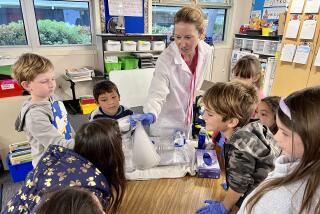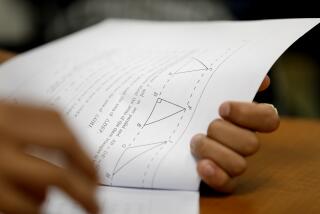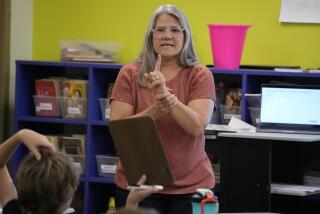Parents’ Attitude, Not Aptitude, Is Key in Tutoring
- Share via
Children are natural scientists and mathematicians. They come to these subjects full of questions, eager for answers. As toddlers, they compare and measure--the quantity of apple juice in their cup versus that in the cups of their brothers or sisters, the number of cookies they have in their hands in relation to the number of cookies in the box.
By the time they enter school, most children are posing endless scientific questions: Why is the sky blue? What causes soap bubbles to float? How do microwaves work? What is on the other side of a light switch? How do we know the multiplication table really works?
For those parents who are able to answer such questions, the danger is in giving too much help, denying children the pleasure of discovery and learning for themselves, said Elaine M. Tobin, a professor of biology at UCLA who also is the mother of two sons and stepmother of two daughters.
But for other parents--surely the majority of American parents--there is the problem of embarrassment, of feeling inadequate in front of children and being put off by their seemingly tireless curiosities.
Too often parents respond “with irritation or ridicule, or quickly move on to something else,” observed Carl Sagan in a recent article on science education.
What parents should do is praise children for their questions and then help them figure out where and how to search for answers, said Sagan, who besides being an astronomer and a renowned science communicator is also the father of four.
There is also, Sagan said, another quite acceptable answer: “I don’t know. . . . Maybe no one knows. Maybe when you grow up, you’ll be the first to find out.”
For parents who want to help their children but don’t know how, there are now many resources to which they can turn, said Marian Diamond, a professor of biology and acting director of Lawrence Hall of Science at UC Berkeley--and a mother of three.
Along with zoos, science museums can now be found in most major metropolitan areas, offering classes and special programs and exhibits for children.
There are also some highly unusual activities now available in many cities. A former science teacher and graduate student at the University of Texas Southwestern Medical Center offers at-home “Einstein science birthday parties,” with party themes such as photosynthesis, dinosaurs, lasers and astronomy. In Los Angeles, children can have birthday parties at the zoo, which also runs a summer educational camp for children.
There are many other examples; parents only have to look--in their newspaper (the calendar column on the Times’ Science/Medicine page on Mondays), in the yellow pages, on the bulletin boards of their children’s schools.
Most libraries and bookstores also stock numerous books on “kitchen science” and “play math.” Two of the most exciting are “Measure Pour and Mix Kitchen Science Tricks,” a book of home science experiments published by Meadowbrook, and the Lawrence Hall of Science’s “Family Math,” a book of problems in probability and statistics, time and money, logic and reasoning designed for the whole family, from 5 years old up.
While such extracurricular activities are an important adjunct to a child’s science and mathematics education, what is crucial are the adults’ attitudes toward learning in general, according to Abe Baumel, principal of New York City’s Stuyvesant High School.
Look at who has historically done well in science and math in this country and look at what those cultures have in common, Baumel suggests.
At the turn of the century, the sons and daughters of Jewish immigrants excelled in science and math. Now, the children of Asian immigrants are dazzling the schools with their scientific and mathematical abilities. Why?
Unlike many American families today who are impatient with teachers and fed up with schools, many Asian-American families continue to teach their children to revere education, to stand in respect, if not awe, of teachers--no matter what their limitations. “It does not take a psychologist or psychiatrist with great insight to see that the children of Japanese and other Asian families are going to behave in school quite differently from children whose parents are always criticizing the schools and complaining about the teachers,” Baumel said.
Similarly, he said, in the Jewish culture, the highest ranking spiritual leader is a rabbi, who is a teacher and whose only job is to be a learned man, to study and pass his learning along to his followers.
In Orthodox Jewish families, there is such a reverence for learning that a book is considered a sacred object. Should it fall to the floor, it must be picked up and kissed; should it become old and unreadable, it must be buried.
“It doesn’t matter how many books you have in the house,” Baumel said. “It doesn’t matter if you’ve gone to a department store and bought a whole bookshelf full of books. It doesn’t matter how much you know. What does matter is your attitude toward learning more than you already know.”






